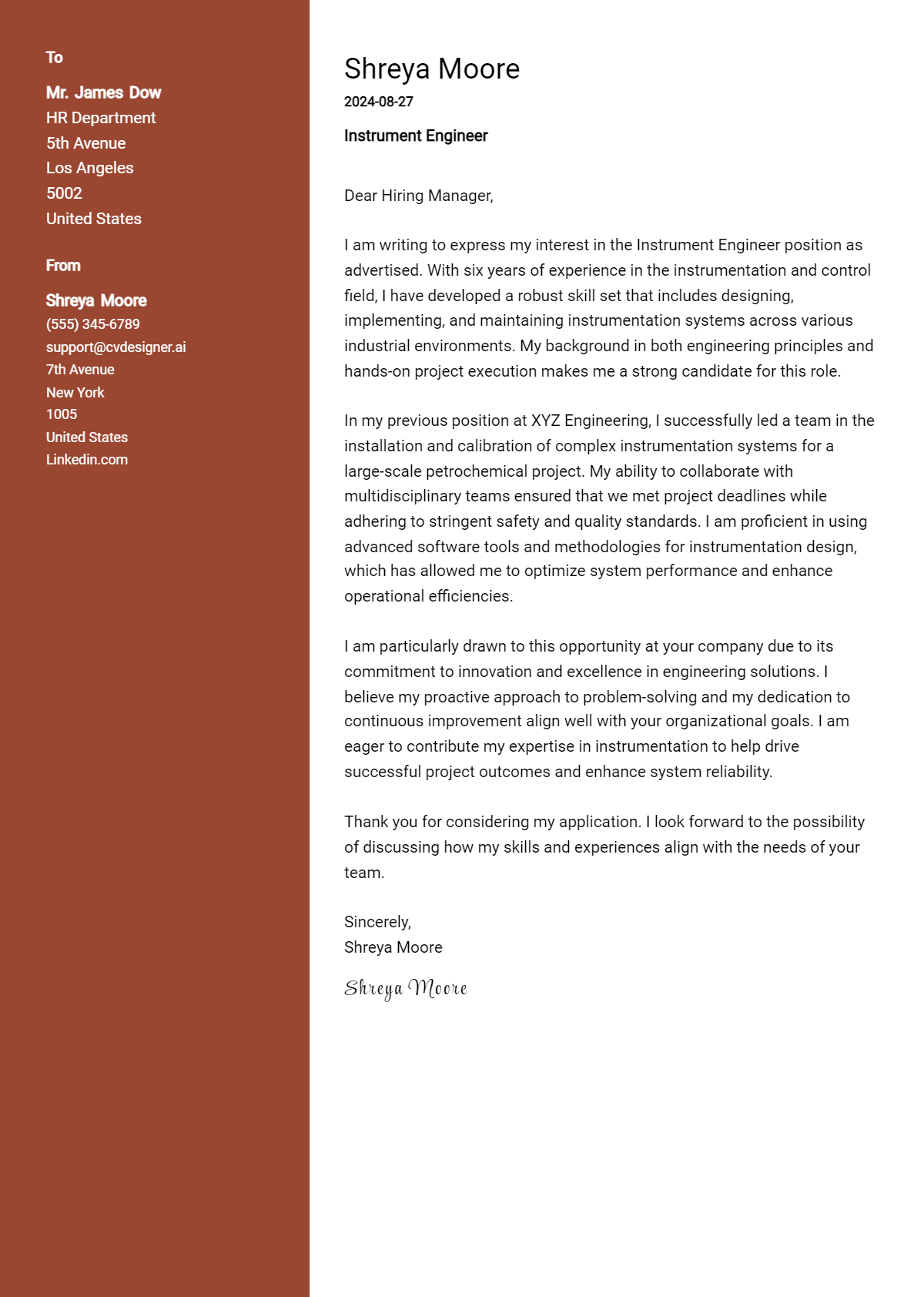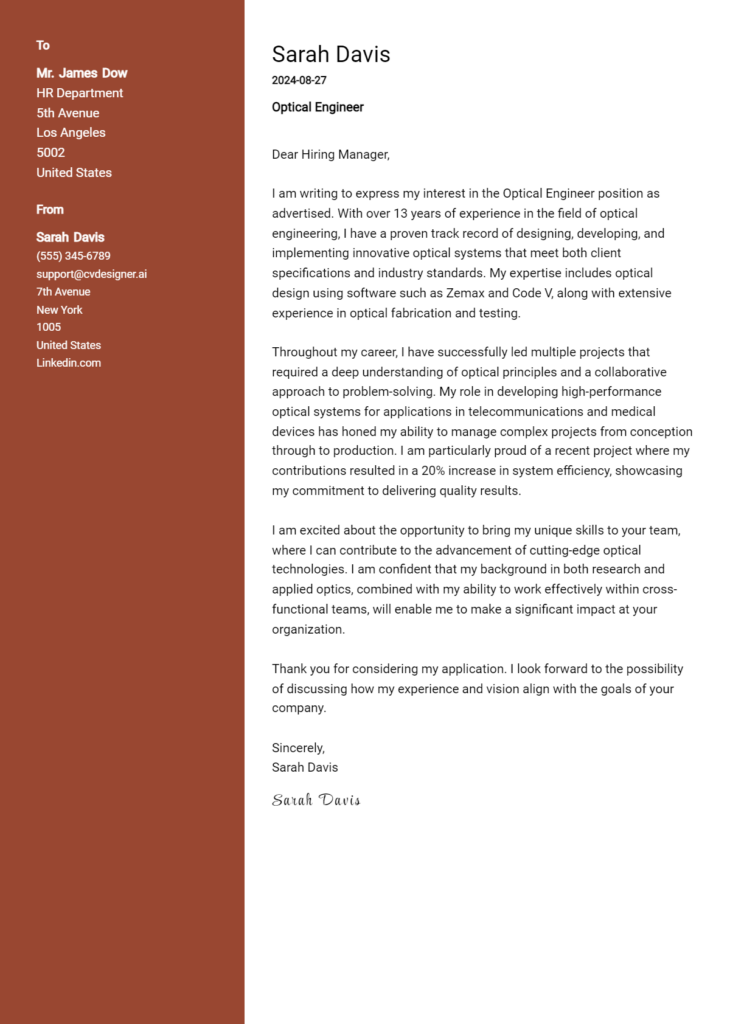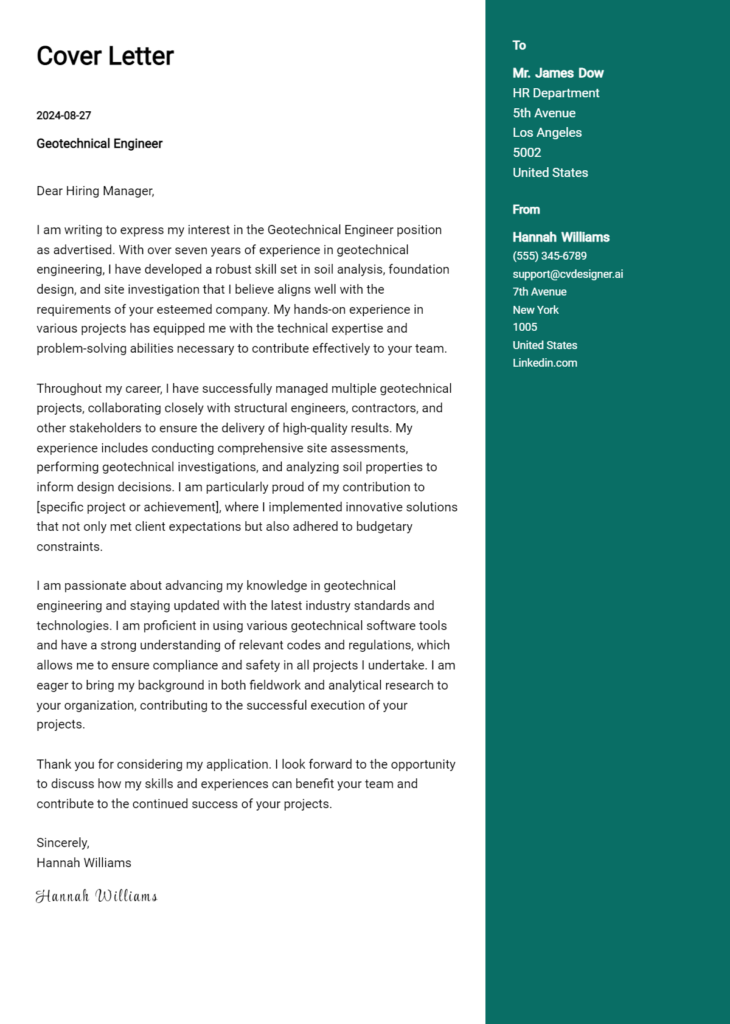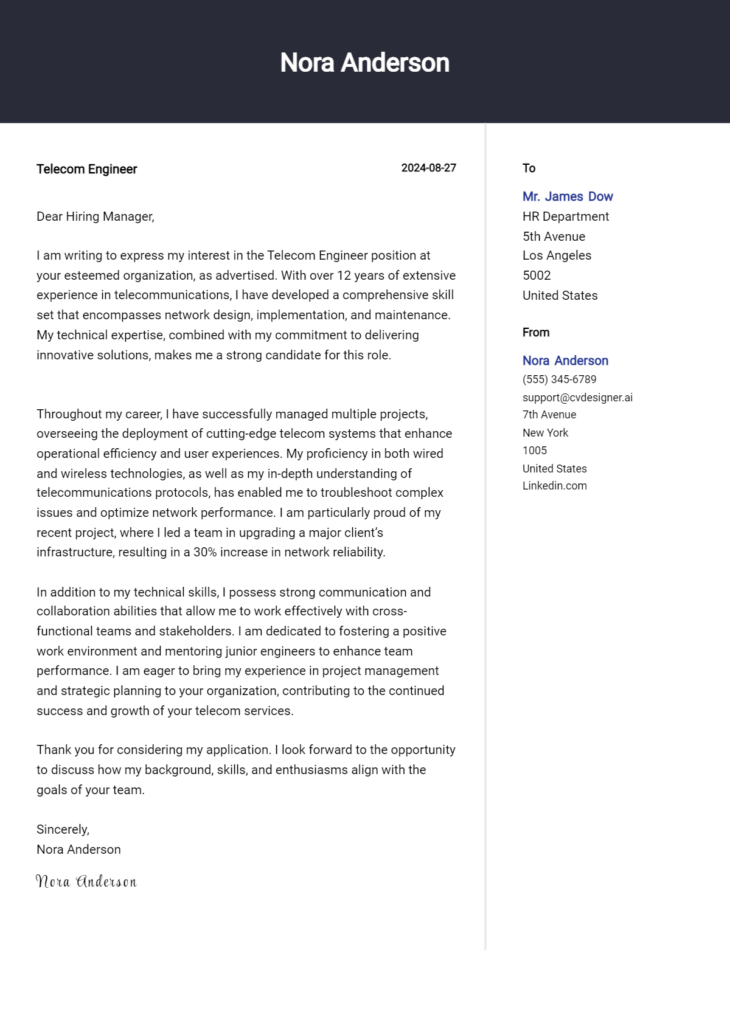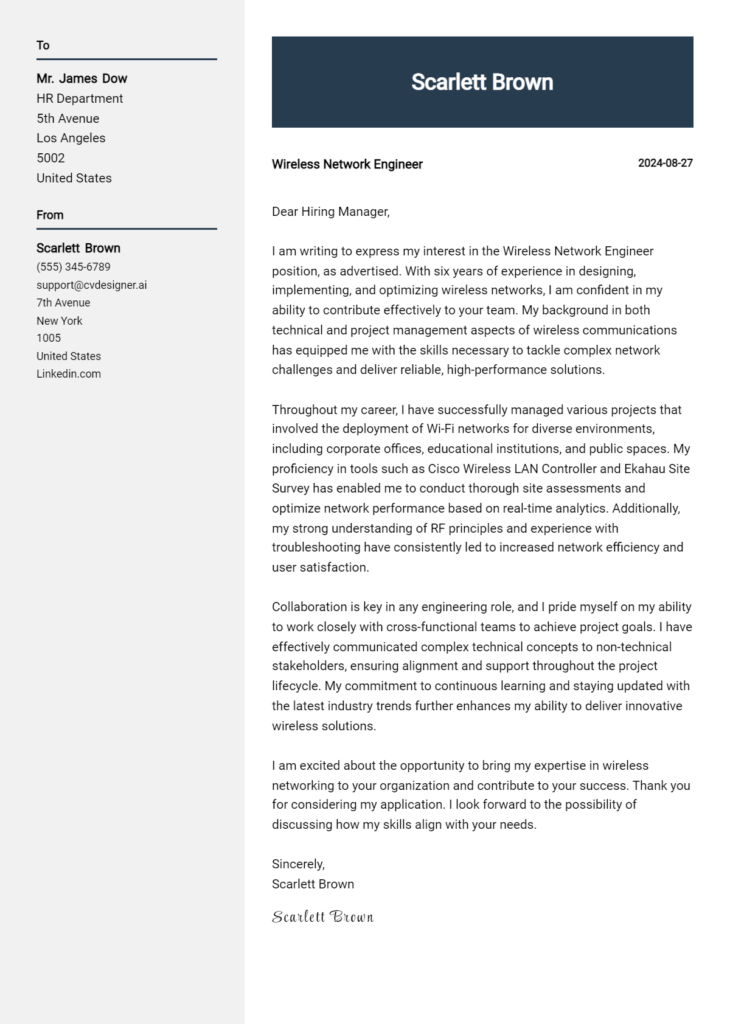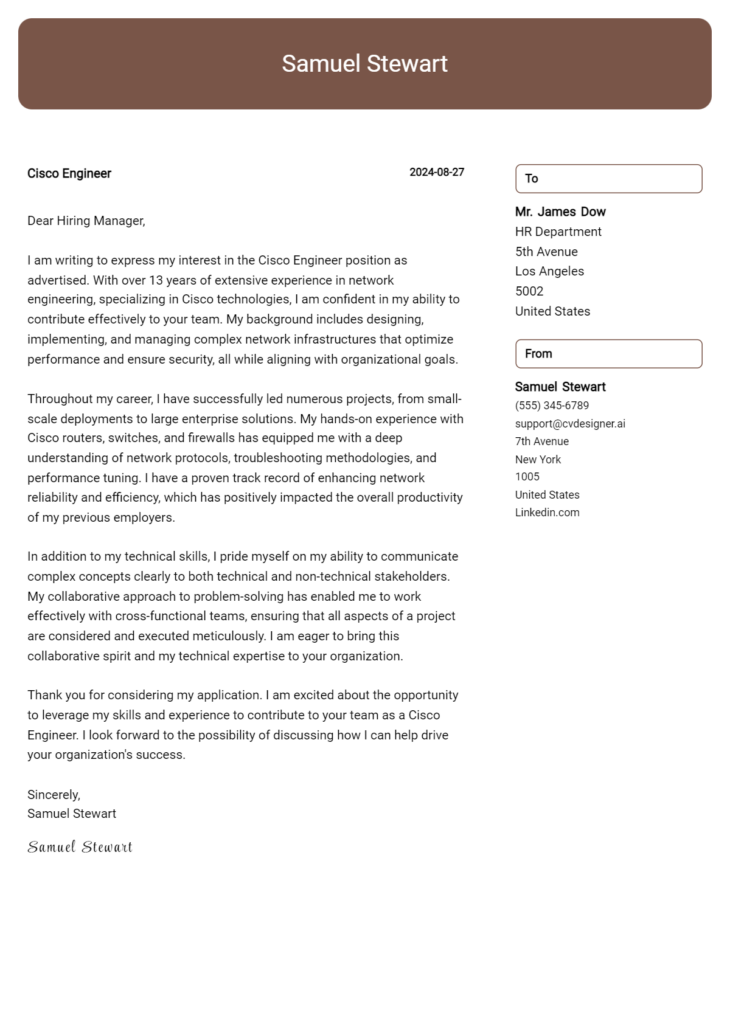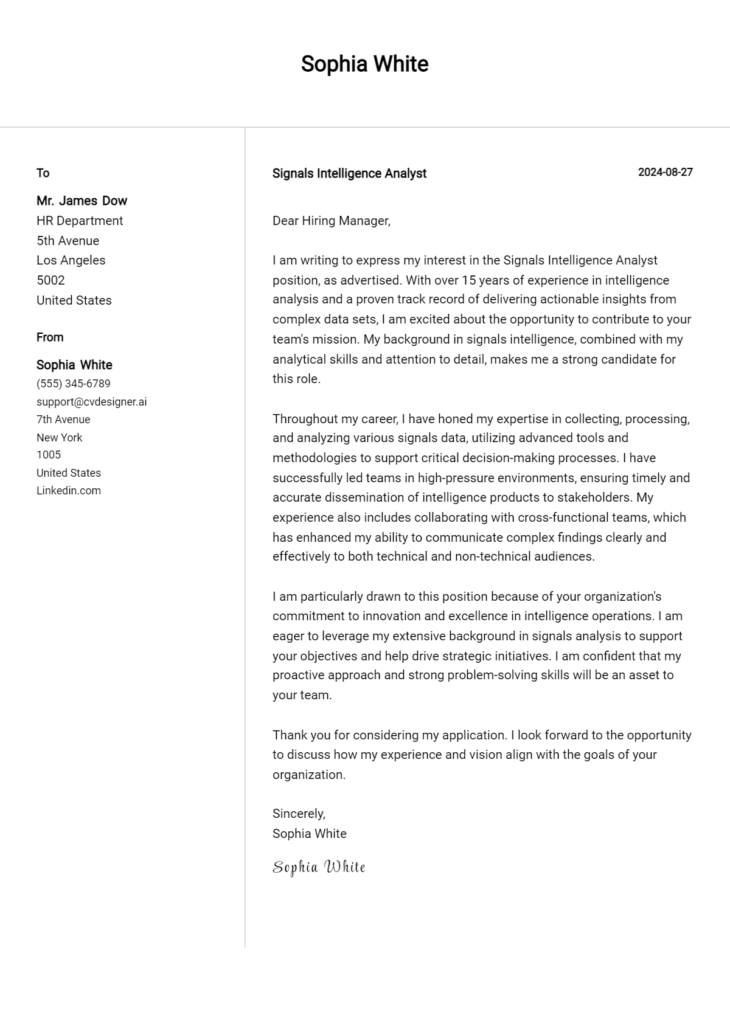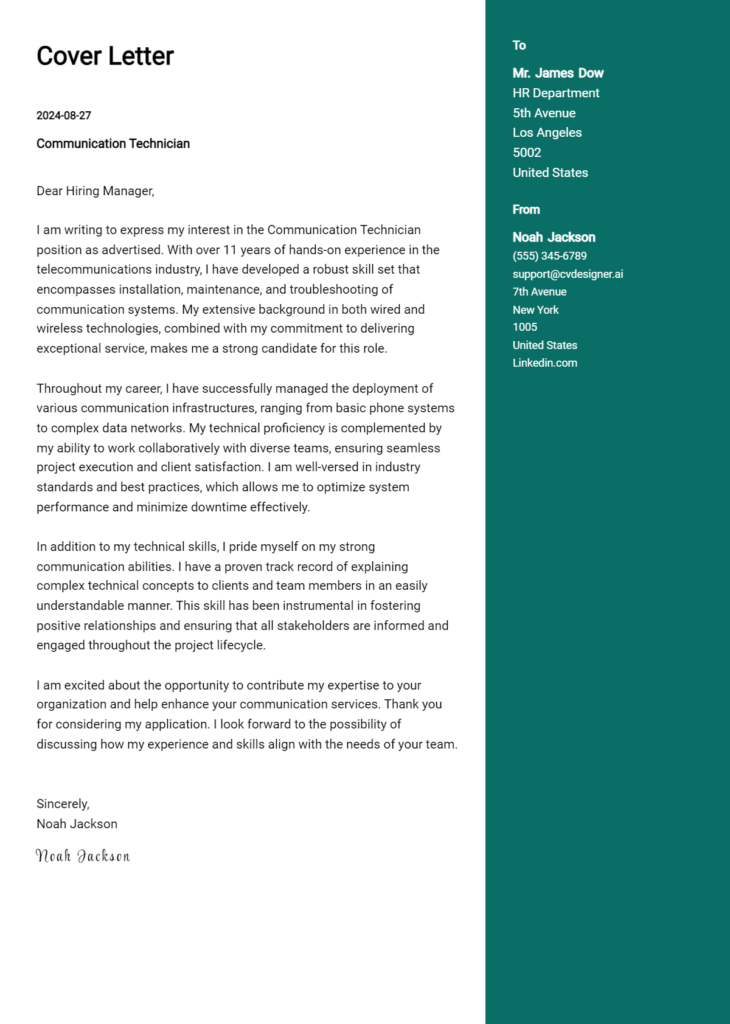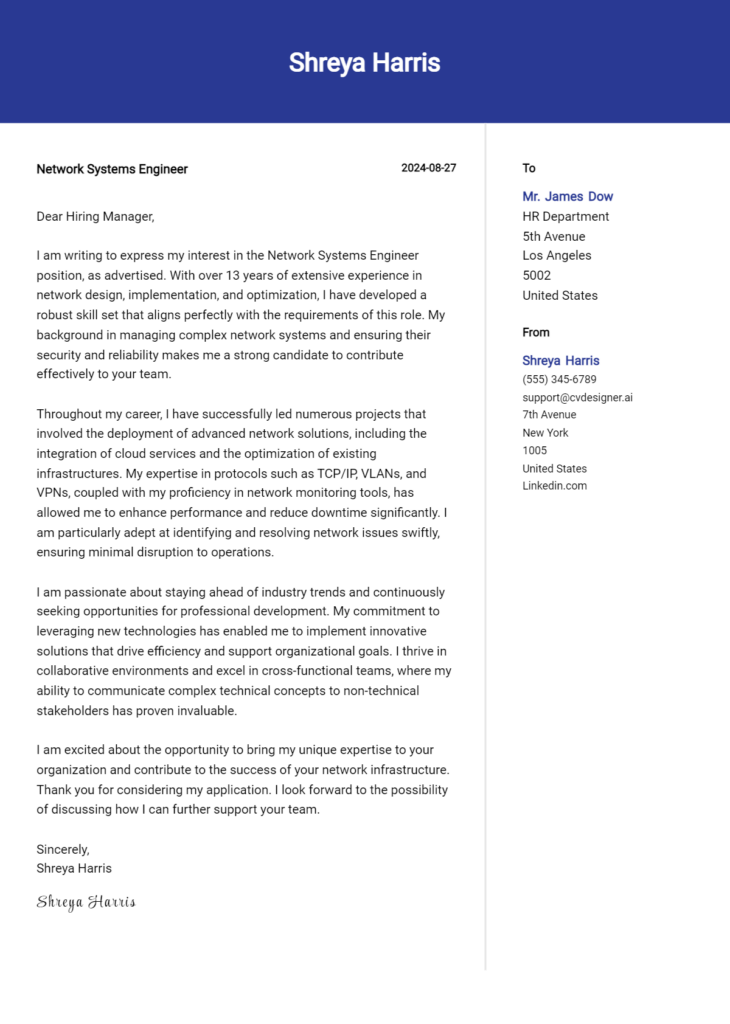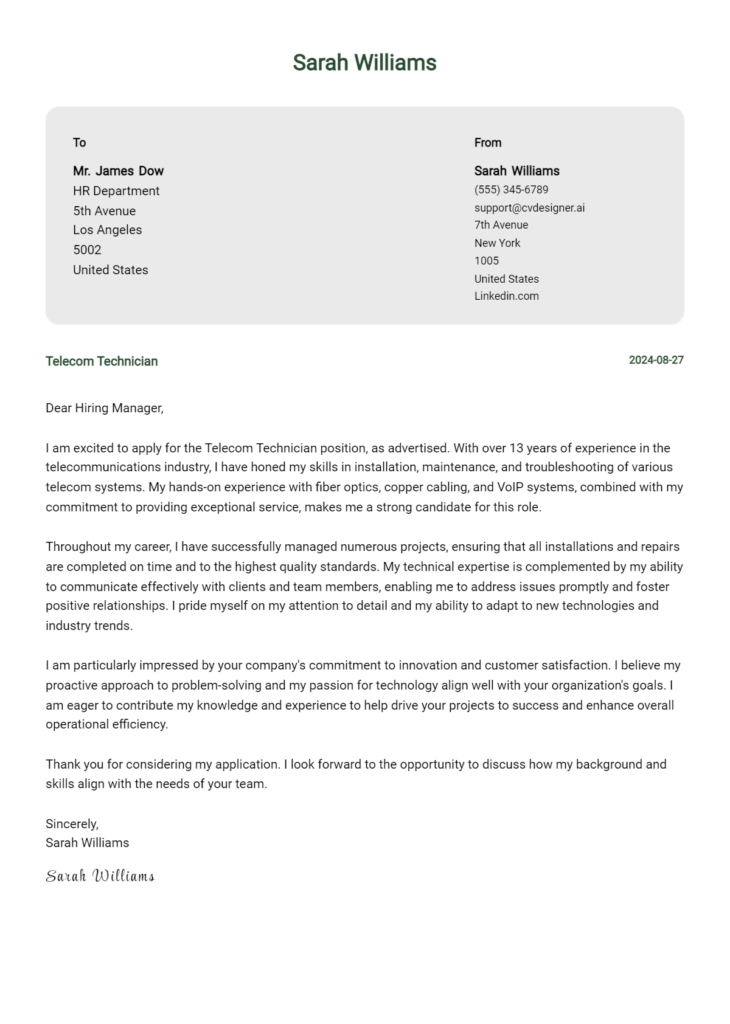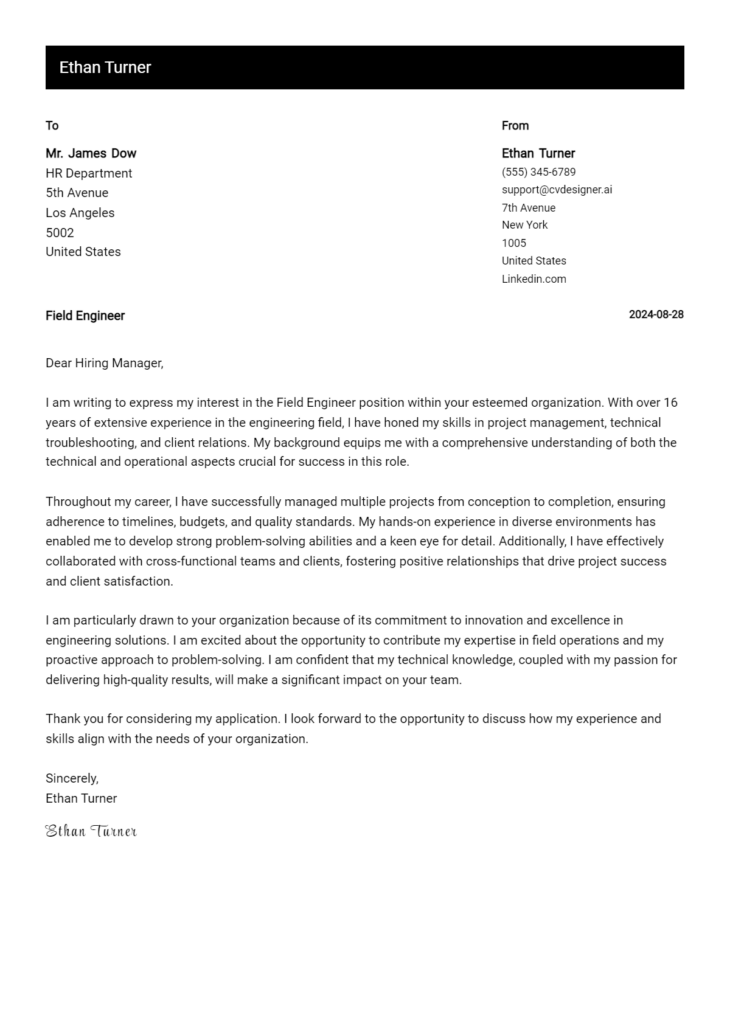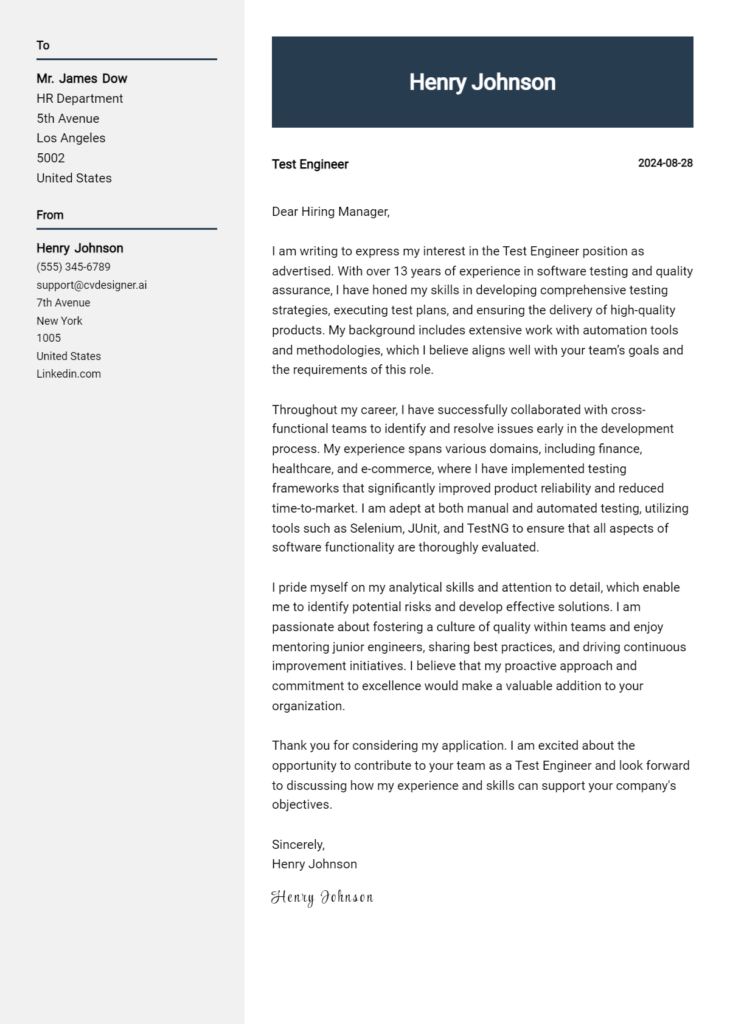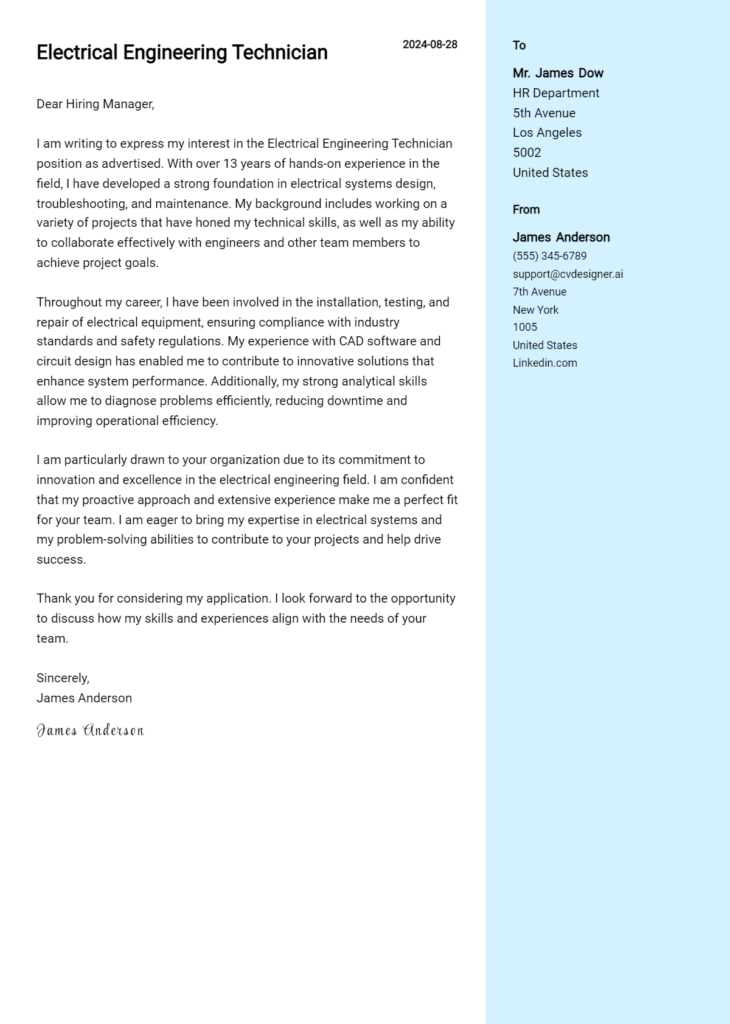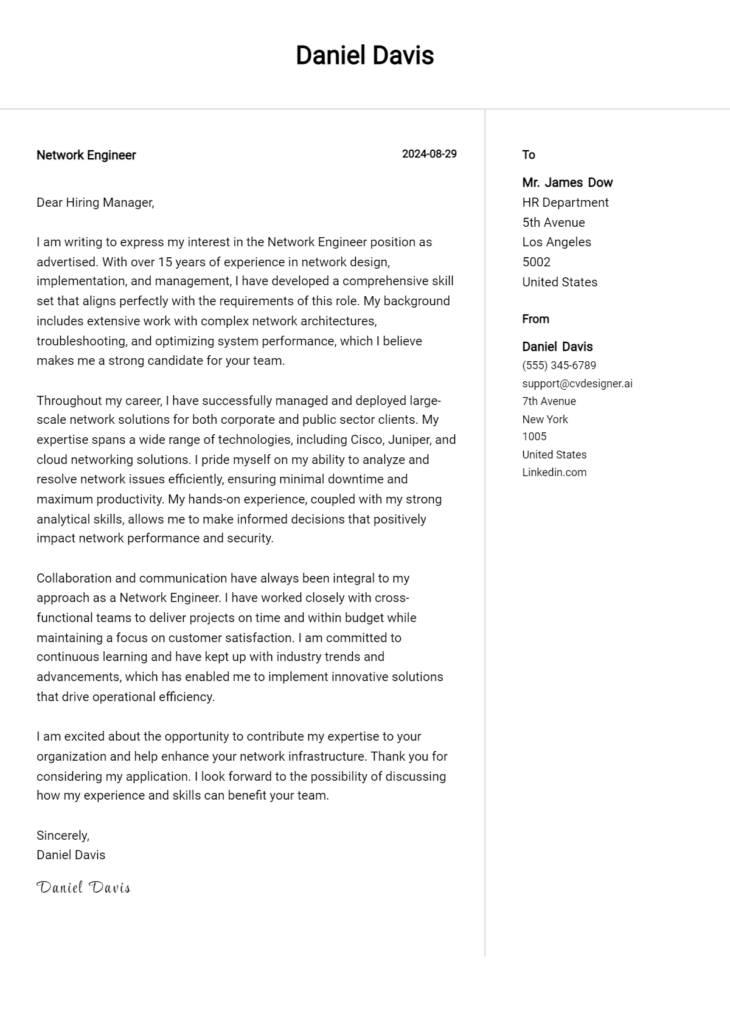Most Popular Instrument Engineer Cover Letter Examples
Explore additional Instrument Engineer cover letter samples and guides and see what works for your level of experience or role.
As an aspiring Instrument Engineer, crafting a compelling cover letter is essential to make a lasting impression on potential employers. This guide will walk you through the intricacies of writing a standout cover letter tailored to the unique demands of the instrumentation field. We will explore how a well-structured cover letter can effectively highlight your skills and experiences while conveying your passion for the role. By the end of this article, you will have a comprehensive understanding of the key components and format needed to create a professional cover letter, alongside three distinct examples catering to different career levels. Moreover, we will identify common mistakes to steer clear of, ensuring your application shines. Here’s what you can expect to learn:
- What does an Instrument Engineer Cover Letter accomplish?
- Key Components of an Instrument Engineer Cover Letter
- Format for an Instrument Engineer Cover Letter
- Three different level cover letter examples
- Common Mistakes to Avoid in an Instrument Engineer Cover Letter
- Key Takeaways
Dive in to equip yourself with the knowledge and tools to craft a persuasive cover letter that opens doors to your engineering career!
What does a Instrument Engineer Cover Letter accomplish?
A cover letter for an Instrument Engineer plays a crucial role in highlighting the applicant's technical expertise and relevant experience while providing a personalized introduction to potential employers. It allows the candidate to articulate their unique qualifications and passion for instrumentation and control systems, showcasing how their skills align with the company's needs. A well-crafted cover letter not only complements the resume but also sets the candidate apart in a competitive job market. For those seeking guidance, a comprehensive cover letter guide can provide valuable insights, while a cover letter builder offers a streamlined approach to crafting a professional and impactful letter.
Key Components of a Instrument Engineer Cover Letter
- Introduction and Purpose: Begin with a strong opening that clearly states the position you are applying for and how you learned about the opportunity. This sets the tone for your cover letter and captures the reader's attention.
- Relevant Experience and Skills: Highlight your specific experience and skills that align with the job requirements of an Instrument Engineer. Use examples from your previous roles to demonstrate your expertise in instrumentation, control systems, and any relevant technologies.
- Passion for the Field: Convey your enthusiasm for the instrumentation engineering field and the particular company you are applying to. Discuss any relevant projects or achievements that showcase your commitment and interest in advancing your career in this area.
- Closing Statement and Call to Action: End your cover letter with a compelling closing statement that expresses your eagerness for an interview and your availability for further discussions. This is also a good place to reiterate your interest in the position and how you can contribute to the company's success. For more insights, you can explore cover letter examples and review the cover letter format for guidance on structuring your letter effectively.
How to Format a Instrument Engineer Cover Letter
As an Instrument Engineer, your cover letter should effectively communicate your technical expertise, relevant experience, and enthusiasm for the role. Here are key points to consider when formatting your cover letter:
- Begin with a strong opening statement that highlights your interest in the position and the company.
- Mention your relevant qualifications, including your degree in instrumentation engineering or a related field.
- Highlight your years of experience in the industry and any specific sectors you’ve worked in (e.g., oil and gas, manufacturing, pharmaceuticals).
- Detail your proficiency with various instrumentation systems, tools, and technologies, emphasizing any specialized skills.
- Discuss any certifications or licenses you hold that are pertinent to the position, such as PLC programming or safety certifications.
- Provide examples of successful projects you’ve completed, showcasing your ability to enhance system performance or reduce costs.
- Emphasize your problem-solving skills and your experience in troubleshooting instrumentation issues.
- Mention your familiarity with industry standards and regulations, such as ISA or IEC, and your commitment to safety and compliance.
- Highlight your ability to work collaboratively with cross-functional teams, including engineers, technicians, and project managers.
- Conclude by expressing your enthusiasm for the role and your eagerness to contribute to the success of the organization.
Instrument Engineer Entry-Level Cover Letter Example #1
I am writing to express my interest in the Instrument Engineer position at [Company Name], as advertised on [where you found the job listing]. With a recent degree in Instrumentation Engineering from [Your University] and a strong foundation in both theoretical and practical aspects of instrumentation, I am eager to contribute my skills and enthusiasm to your team.
During my academic career, I completed a comprehensive internship with [Previous Company/Internship Site], where I assisted in the installation, calibration, and maintenance of various instrumentation systems. This experience allowed me to gain hands-on knowledge of control systems, process instrumentation, and data analysis techniques. I collaborated closely with senior engineers to troubleshoot equipment issues, which honed my problem-solving abilities and taught me the importance of precision and attention to detail in the engineering field.
In addition to my technical skills, I have developed strong teamwork and communication abilities through various group projects and presentations during my studies. I believe that effective collaboration is essential in engineering, and I am confident in my ability to work well with diverse teams. I am particularly drawn to [Company Name] because of its commitment to innovation and excellence in the field of instrumentation, and I am excited about the opportunity to contribute to your projects while continuing to learn and grow as an engineer.
Thank you for considering my application. I am looking forward to the opportunity to discuss how my background, skills, and enthusiasms align with the needs of your team. I am eager to bring my strong work ethic and fresh perspective to [Company Name] and contribute to the success of your projects. Please feel free to contact me at [Your Phone Number] or [Your Email Address] to schedule a conversation.
Instrument Engineer Mid-Level Cover Letter Example #2
I am writing to express my interest in the Instrument Engineer position at [Company Name], as advertised on [Job Board/Company Website]. With over [X years] of experience in the field of instrumentation and control systems, I have developed a strong foundation in designing, implementing, and maintaining instrumentation solutions that enhance operational efficiency and safety. My background in both project management and technical engineering makes me a well-rounded candidate for this role.
In my previous position at [Previous Company Name], I successfully led a team in the design and installation of advanced process control systems for [specific project or industry], which resulted in a [specific achievement, e.g., a 20% increase in operational efficiency or a 15% reduction in downtime]. My hands-on experience with various types of instrumentation, including flow, pressure, temperature, and level measurement devices, has equipped me with the skills necessary to troubleshoot and optimize complex systems. I have also collaborated closely with cross-functional teams, ensuring that project objectives are met while adhering to safety regulations and industry standards.
Furthermore, my proficiency in using software tools such as [specific software, e.g., AutoCAD, MATLAB, or specific control system software] has allowed me to create detailed documentation and designs that facilitate seamless project execution. I am dedicated to continuous learning and have recently completed [relevant certification or training, e.g., ISA certification], which has deepened my knowledge of industry best practices and emerging technologies. I am eager to bring this expertise to [Company Name] and contribute to innovative solutions that drive performance and reliability.
I am excited about the opportunity to join [Company Name] and contribute to your ongoing success in the instrumentation field. I am confident that my technical skills, project management experience, and passion for engineering will make me a valuable addition to your team. Thank you for considering my application. I look forward to the possibility of discussing how my background and your needs align in more detail.
Instrument Engineer Experienced Cover Letter Example #3
I am writing to express my interest in the Instrument Engineer position at [Company Name], as advertised on [where you found the job listing]. With over [X years] of extensive experience in the field of instrumentation engineering, I have developed a robust skill set that aligns perfectly with the requirements of this role. My background in designing, maintaining, and optimizing instrumentation systems has equipped me with the technical expertise and problem-solving abilities necessary to contribute effectively to your team.
Throughout my career, I have successfully managed numerous projects that required a deep understanding of control systems, process automation, and instrumentation design. At [Previous Company Name], I led a team responsible for upgrading the instrumentation on a large-scale petrochemical facility. This involved conducting thorough assessments of the existing systems, identifying areas for improvement, and implementing advanced solutions that enhanced operational efficiency by [specific percentage] while reducing downtime. My hands-on experience with various instrumentation technologies, including [specific technologies or systems], allows me to devise innovative strategies that drive performance and safety.
Moreover, I have a proven track record of collaborating with cross-functional teams to ensure that instrumentation designs not only meet technical specifications but also adhere to regulatory standards. My role in the development of a comprehensive safety management system at [Another Previous Company Name] exemplifies my commitment to safety and compliance. By integrating risk assessment protocols and leveraging predictive maintenance techniques, we were able to reduce incidents and ensure the integrity of our systems, ultimately saving the company substantial costs.
In addition to my technical skills, I pride myself on my ability to mentor and lead junior engineers, fostering a culture of continuous learning and professional growth within the team. I believe that knowledge sharing and collaboration are vital to driving innovation and achieving project goals. My experience in conducting training sessions and workshops has not only enhanced team performance but has also established a strong foundation for future projects.
I am excited about the opportunity to bring my expertise to [Company Name] and contribute to your commitment to excellence in instrumentation engineering. I am confident that my extensive experience, coupled with my passion for innovative solutions, will enable me to make a significant impact on your team. Thank you for considering my application. I look forward to the possibility of discussing how my background, skills, and enthusiasms align with the goals of [Company Name].
Cover Letter Tips for Instrument Engineer
When crafting a cover letter for an Instrument Engineer position, it’s essential to highlight your technical expertise and problem-solving abilities in relation to instrumentation and control systems. Begin with a strong opening that captures the hiring manager’s attention and clearly states your interest in the role. Use specific examples of your past experiences to demonstrate how your skills align with the job requirements. Tailor your letter to the company by researching its projects and values, and make connections between your professional achievements and their mission. Finally, ensure your letter is concise, well-organized, and free of errors to present yourself as a detail-oriented candidate.
- Tailor Your Letter: Customize your cover letter for each job application, reflecting the specific requirements and values of the company.
- Highlight Relevant Experience: Emphasize your hands-on experience with instrumentation systems, control technologies, and any relevant software tools.
- Showcase Technical Skills: Clearly list specific skills such as PLC programming, SCADA systems, or calibration techniques that are pertinent to the role.
- Use Quantifiable Achievements: Include metrics or outcomes from past projects to illustrate the impact of your work, such as improved efficiency or reduced downtime.
- Demonstrate Problem-Solving Abilities: Provide examples of challenges you’ve faced in previous roles and how your solutions benefited the project or team.
- Professional Language: Maintain a formal tone, using industry-specific terminology that resonates with the hiring manager.
- Include Certifications: Mention any relevant certifications or training that enhance your qualifications, such as ISA or other engineering-related credentials.
- End with Enthusiasm: Conclude your letter by expressing enthusiasm for the role and the opportunity to contribute to the company’s success.
How to Start a Instrument Engineer Cover Letter
When crafting a cover letter for an Instrument Engineer position, it's important to make a strong first impression. The introduction should highlight your relevant experience, skills, and enthusiasm for the role. Here are some effective examples to consider:
- As a dedicated Instrument Engineer with over five years of experience in designing and maintaining complex instrumentation systems, I was thrilled to discover the opportunity at [Company Name]. My background in process control and automation aligns perfectly with the innovative projects your team is undertaking.
- With a solid foundation in instrumentation and control systems, I am excited to apply for the Instrument Engineer position at [Company Name]. My hands-on experience in optimizing measurement systems and a commitment to improving operational efficiency would contribute significantly to your esteemed team.
- I am writing to express my interest in the Instrument Engineer role at [Company Name]. With a Master’s degree in Electrical Engineering and extensive experience in the oil and gas sector, I possess the technical expertise and problem-solving skills necessary to excel in this position.
- As a results-driven Instrument Engineer with a proven track record in both project management and technical implementation, I was excited to learn about the opening at [Company Name]. My ability to collaborate with cross-functional teams to enhance instrumentation reliability and accuracy makes me a strong candidate for this role.
- I am eager to bring my expertise in instrumentation and control to the Instrument Engineer position at [Company Name]. With over seven years of experience in designing and troubleshooting instrumentation systems, I am confident in my ability to contribute to your company’s success and innovation.
How to Close a Instrument Engineer Cover Letter
As you conclude your cover letter for the Instrument Engineer position, it's essential to leave a lasting impression that highlights your enthusiasm and willingness to contribute to the team. Here are some effective closing statements you can use:
I am excited about the opportunity to contribute my expertise in instrumentation and control systems to your esteemed company and look forward to discussing how my skills can help achieve your goals.
Thank you for considering my application. I am eager to bring my background in instrumentation engineering to your team and would love the opportunity to discuss my fit for this role in further detail.
I appreciate your time and consideration. I am confident that my technical knowledge and problem-solving skills will be a valuable addition to your team, and I look forward to the possibility of an interview.
I am looking forward to the possibility of contributing to your projects and am eager to bring my passion for instrumentation engineering to your team. Thank you for this opportunity.
Common Mistakes to Avoid in a Instrument Engineer Cover Letter
When applying for a position as an Instrument Engineer, your cover letter serves as a critical introduction to your qualifications and enthusiasm for the role. It’s your chance to highlight your technical skills, relevant experience, and the value you can bring to the company. However, many candidates make avoidable mistakes that can undermine their chances of landing an interview. To help you craft a compelling cover letter, here are some common pitfalls to steer clear of:
- Failing to tailor the cover letter to the specific job description and company.
- Using a generic greeting instead of addressing the hiring manager by name.
- Overloading the letter with technical jargon without explaining it.
- Neglecting to highlight relevant certifications or training specific to instrumentation.
- Writing in a verbose manner rather than being concise and to the point.
- Ignoring the importance of proofreading for spelling and grammatical errors.
- Focusing too much on past job duties instead of showcasing achievements and results.
- Omitting a clear statement of interest or passion for the field of instrumentation.
- Not including a call to action, such as expressing a desire for an interview or further discussion.
- Making the letter too long; aim for one page to keep it engaging and readable.
Key Takeaways for a Instrument Engineer Cover Letter
In conclusion, a well-crafted cover letter for an Instrument Engineer position should emphasize your technical expertise, problem-solving abilities, and familiarity with industry standards. Highlight your experience with instrumentation systems, control systems, and relevant software applications to showcase your suitability for the role. Additionally, make sure to convey your enthusiasm for the opportunity and how your skills align with the company’s objectives. Utilizing cover letter templates can help you structure your letter effectively, ensuring that you present your qualifications in a professional manner.
Moreover, consider using a cover letter builder to streamline the writing process, allowing you to focus on tailoring your message to the specific job you are applying for. This can enhance clarity and create a visually appealing document that captures the attention of hiring managers. By following these guidelines, you can create a compelling cover letter that sets you apart from other candidates and increases your chances of landing an interview.
